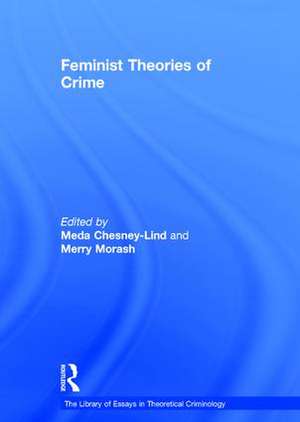Feminist Theories of Crime: The Library of Essays in Theoretical Criminology
Autor Merry Morash Editat de Meda Chesney-Linden Limba Engleză Hardback – 28 oct 2011
Preț: 1726.75 lei
Preț vechi: 2485.09 lei
-31% Nou
Puncte Express: 2590
Preț estimativ în valută:
330.42€ • 345.68$ • 274.48£
330.42€ • 345.68$ • 274.48£
Comandă specială
Livrare economică 12-26 martie
Doresc să fiu notificat când acest titlu va fi disponibil:
Se trimite...
Preluare comenzi: 021 569.72.76
Specificații
ISBN-13: 9780754629719
ISBN-10: 0754629716
Pagini: 592
Dimensiuni: 174 x 246 x 42 mm
Greutate: 2.9 kg
Ediția:New.
Editura: Taylor & Francis
Colecția Routledge
Seria The Library of Essays in Theoretical Criminology
Locul publicării:Oxford, United Kingdom
ISBN-10: 0754629716
Pagini: 592
Dimensiuni: 174 x 246 x 42 mm
Greutate: 2.9 kg
Ediția:New.
Editura: Taylor & Francis
Colecția Routledge
Seria The Library of Essays in Theoretical Criminology
Locul publicării:Oxford, United Kingdom
Cuprins
Contents: Introduction; Part I Feminist Epistemology: Researching girls and violence: facing the dilemmas of fieldwork, Michele J. Burman, Susan A. Batchelor and Jane A. Brown; Producing feminist knowledge: lessons from women in trouble, Elizabeth Comack; Women's violence to men in intimate relationships: working on a puzzle, Russell P. Dobash and R. Emerson Dobash. Part II Patriarchy, Crime and Justice: Women in the street-level drug economy: continuity or change?, Lisa Maher and Kathleen Daly; The risks of street prostitution: punters, police and protesters, Teela Sanders; Theorizing about violence: observations from the Economic and Social Research Council's violence research program, Elizabeth A. Stanko. Part III Masculinities and Femininities: Accomplishing femininity among the girls in the gang, Karen Joe Laidler and Geoffrey Hunt; Girls' violence: beyond dangerous masculinity, Katherine Irwin and Meda Chesney-Lind; Missing gender in cases of infamous school violence: investigating research and media explanations, Mona J.E. Danner and Dianne Cyr Carmody; Immigration, masculinity, and intimate partner violence from the standpoint of domestic violence service providers and Vietnamese-origin women, Hoan Bui and Merry Morash. Part IV Intersections: An argument for Black feminist criminology: understanding African American women's experiences with intimate partner abuse using an integrated approach, Hillary Potter; 'It's not where you live, it's how you live': how young women negotiate conflict and violence in the inner city, Nikki Jones; Walking a tightrope: the many faces of violence in the lives of racialized immigrant girls and young women, Yasmin Jiwani; Intersections of immigration and domestic violence: voices of battered immigrant women, Edna Erez, Madelaine Adelman and Carol Gregory. Part V Feminist Assessments of the Criminal Justice Enterprise: Gender bias and juvenile justice revisited: a multiyear analysis, John M. Macdonald and Meda Chesney-Lind; Criers, liars and manipulators: probation officers' views of girls, Emily Gaarder, Nancy Rodriguez and Marjorie S. Zatz; The words change but the melody lingers: the persistence of battered woman syndrome in criminal cases involving battered women, Kathleen J. Ferraro; Moral agent or actuarial subject: risk and Canadian women's imprisonment, Kelly Hannah-Moffat; Embodied surveillance and the gendering of punishment, Jill A. McCorkel; Celling Black bodies: Black women in the global prison industrial complex, Julia Sudbury. Part VI Feminist Perspectives on the Law and on Justice: Predators: the social construction of 'stranger-danger' in Washington state as a form of patriarchal ideology, Neal S. Websdale; Feminist engagement with restorative justice, Kathleen Daly and Julie Stubbs; Gendered war and gendered peace: truth commissions and postconflict gender violence: lessons from South Africa, Tristan Anne Borer; Name index.
Notă biografică
Meda Chesney-Lind, Ph.D. is Professor of Women's Studies at the University of Hawaii at Manoa. Nationally recognized for her work on women and crime, her books include Girls, Delinquency and Juvenile Justice (Wadsworth, 1992), The Female Offender: Girls, Women and Crime (Sage, 1997), Female Gangs in America (Lakeview Press, 1999), Invisible Punishment (New Press, 2002), Girls, Women and Crime (Sage, 2004), Beyond Bad Girls: Gender Violence and Hype (Routledge, 2008) and Fighting for Girls: Critical Perspectives on Gender and Violence (SUNY Press, 2010). Merry Morash, Ph.D., is Professor at the School of Criminal Justice, Michigan State University. Her books include Understanding Gender, Crime, and Justice (Sage, 2006) and Women on Probation and Parole: A Feminist Critique of Community Programs and Services (Northeastern University Press, 2010). She has published on a wide range of topics that include domestic violence among immigrant groups, gender as it pertains to police stress and coping, community oriented policing, and juvenile delinquency causation in numerous different journals and edited books. She directs the Michigan Victim Assistance Academy, which for over a decade has trained professionals who work with crime victims.
Descriere
This collection of essays re-imagines the field of criminology with insights gleaned from feminist theory. Factors such as gender, patriarchy and other systems of oppression such as race and class are highlighted as essential to an understanding of crime problems and the criminal justice system. The articles also reflect the feminist concern that all research should have the crucial goal of producing knowledge that will promote social justice.











